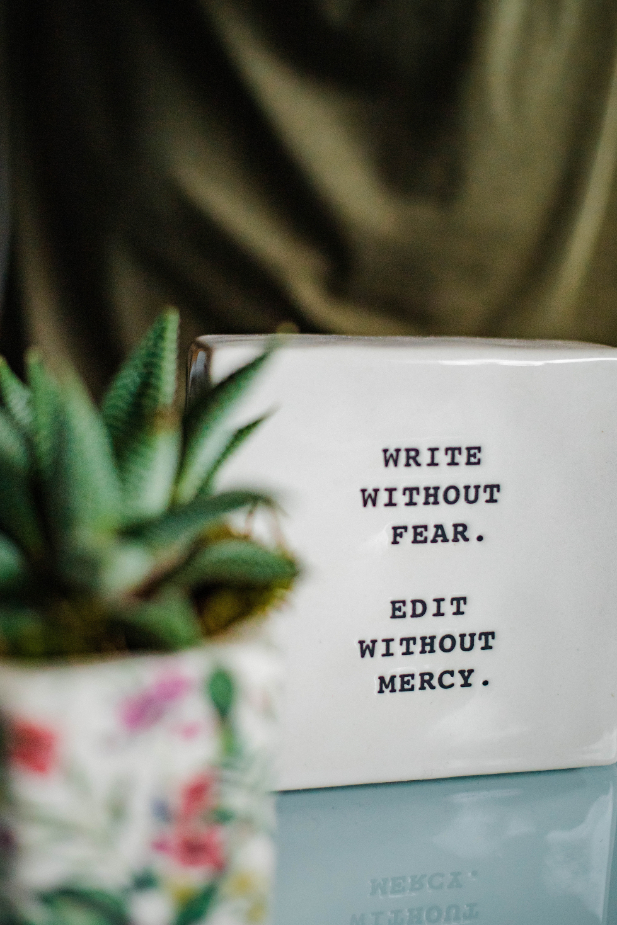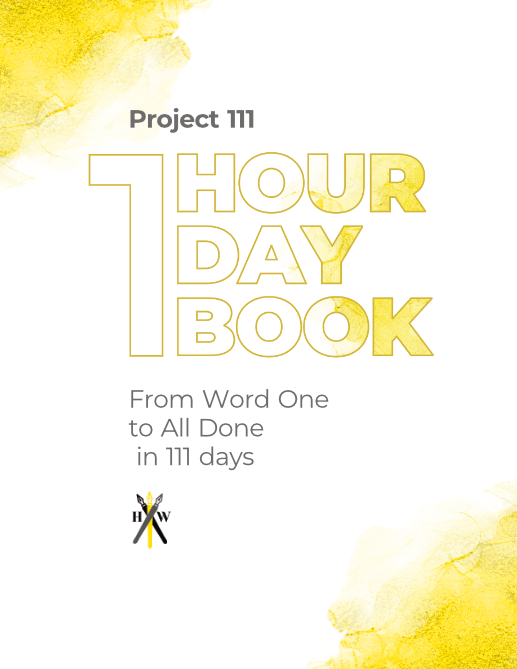I know how you feel. You’ve got a killer story idea, a dynamic main character, you’ve studied up on story structure, you might even have an outline (depending on your writing personality type). You just can’t seem to sit down and write! You’ve got all those things and what’s the big challenge? Finishing. Often the toughest part for new writers on their novel-writing journey is finishing that first rough draft. So, you ask, how to finish a novel?
Pop quiz: When writing your next big novel, which type of writing goal will allow you to finish faster: writing 200 words a day, or 2000 words a week?
The mathematical answer is clearly 2000 words a week, as that is a 600-word advantage over the other method.
But, my dear fellow writers, as we all know, writing is not math. I suspect that you will finish a novel faster by writing 200 words a day, rather than 2000 a week. Death to thee math!*
But why would it be faster? Because most unpublished writers overlook the many advantages of daily writing. We will explore those advantages and some pitfalls to avoid as well. These writing tips and hacks will help you reach the coveted moment of writing: “The End”.

How to Finish a Novel with Daily Writing
1. Presence of Mind
“Writing, to me, is simply thinking through my fingers.” – Isaac Asimov
if your goal is to write 2000 words a week, what do you think is the likelihood that you procrastinate until the last day? For some of you, it may be 10% of the time, or even lower, but for myself, It is likely that I’ll procrastinate 50% of the time. When you’ve not been writing in a project for a week, how much time do you need to spend refreshing yourself on the details from your last writing session?
For me, the answer is a lot.
But with a daily goal–whether that be word count or time allotted–you can often sit down and pick right back up from where you left off with little to no refresh needed. This is because your mind is in your story on a daily basis.
And even better than that, if you’re constantly thinking about your book, you will be opening yourself up to fresh inspiration. A new idea can jump into your head at any given moment, and those moments are far more likely to happen if you are in your novel daily.

2. Fail Fast, Fail Often, Fail Softly
“Failure is so important. We speak about success all the time. It is the ability to resist failure or use failure that often leads to greater success. I’ve met people who don’t want to try for fear of failing.” – J.K Rowling
If you ask a professional writer or published author, what makes a successful writer, I suspect that many will tell you that you just have to commit and put yourself out there. In other words, you have to open yourself up to failure. As a fellow writer, I can tell you I know how scary that is. It is hard to put our work out there and to continue to make progress. But by having a daily goal, we allow ourselves to fail often and fail softly.
Things will get in the way, and you will most likely miss a day of writing at some point. But if you have a goal of 2000 words a week and you write 1000? Where does your mind go?
Does it say, “hooray! I completed half of my goal! Can’t wait for next week!”
If you’re like me, it’s more like, “I failed at my goal, and it wasn’t that hard.”
with a daily writing goal, sure you might miss a day, but that’s only 200 words. Just do better the next day.

3. The Power of Small Steps
“The secret of getting ahead is getting started. The secret of getting started is breaking your complex overwhelming tasks into small manageable tasks, and starting on the first one.” – Mark Twain
If you had to leap from the bottom of a staircase to the top, could you make it? For most staircases, no. Thus each step is there to break that monumental task into smaller ones.
By embracing the key of small minimums, such as 200 words a day, or 10 minutes a day, you are empowering yourself to take small steps toward the larger goal. However large the writing project, every short story or novel writing venture is easier to manage with small daily goals.
What is the key to getting past writer’s block? Most often, it’s just to keep on writing. The writing process takes work and sacrifice and is very complex work. But by committing to complete your small daily goals, you can often get through those rough patches.
Another strength of small minimums is no maximum. As you make the effort to write a little, then all you have to do is write a little on days when it is hard. But on days when your inspiration is truly flowing, you can write as much as you like.
Small minimums encourage your writing habit, and if you are able to create an effective writing habit, then you have unlocked the key to becoming a writer.
Whether writing an epic 400,000-word fiction masterpiece, a graphic novel, or your romantic debut novel, daily writing will get you to where you want to be and help you build a habit of writing.

4. Protect your Momentum
“Now is no time to think of what you do not have. Think of what you can do with that there is.” – Ernest Hemingway
with a daily writing schedule, you have a key factor to finishing any large project: momentum. If your brain feels like you’re making progress then you are much more likely to continue to make progress. So anything you can do to keep your brain engaged in the process and to feel like you are actually making progress then that will allow you to actually finish.
By keeping your focus on the small daily goals, you can and must give yourself credit for doing something hard. Keep in mind that what you are writing is a novel draft. So no matter how much ineffective dialogue, or boring descriptions, or terrible chapters you write, keep going. You can fix it later! (See the first common trap below.)
Keep going! FINISH! THAT IS YOUR ONLY GOAL!
All of the problems that are in your first draft are meant to be there. That’s what a first draft is meant to be.
By sticking to your process of writing a little bit each day. You will be able to keep on pushing through to the end and trust in the power of editing to fix any problems with what you’ve written. Once you’ve finished you can get past that mental block that finishing a novel is an impossible feat.
Common Traps to Avoid
Writing novels is a difficult task for anyone. If you want to succeed at it then you need to focus on your process and habits. But there are some traps that our own brains set for ourselves that you need to avoid at all costs! It’s important to learn what they are so you can recognize them before they rob you of reaching your goals.

1. Finish Before Fixing
This one goes hand in hand with protecting your momentum from the last section. This one happens all the time to all of us. It goes something like this. You realize halfway through a chapter that you should have included another character in the scene. Or worse, you need to go back and change the magic system in chapter 2 which would change chapters 4 and 5 and that would mean that Gary never went to the ball in chapter 7, and… the cascade continues.
This is a trap because it puts us in a place where we just keep changing our story and never feel like we are making progress. This trap can rob you of your momentum and can lead to countless loose threads, inconsistency, and add a whole bunch to the editing process that bogs you down and keeps you from reaching the end.
How to avoid this trap? Simple. Keep writing as if the whole thing is fixed anyways. You’ve got the story in your head and you know that Henrietta had to be in a certain place in chapter 2 to make the conflict work. Great! Make a note and then write Henrietta into your current scene as if it was already fixed. Keep going and keep making progress at all costs.
Why does this work? It keeps your momentum, and when you have a new idea about how Henrietta should actually die in chapter 5 then great! You didn’t waste any of your time fixing chapter 5 so you can keep writing with that new scope in mind. You will fix it all in post, meaning post-writing the glorious word “fin”. Once you have written the whole ending, then you will likely see the whole thing in a different light.
Fixes are for the second draft. The second draft is your space to make it look like you had the whole thing figured out from the very start. So make sure that you keep your first draft goal in perspective. FINISH IT! That is your only mission, should you choose to accept it. A beta reader is going to be a lot better at telling you where you went wrong in your manuscript than you will be when crafting your first draft.

2. The Planning Fallacy
This fallacy has received a lot of press, and it’s actually pretty potent in our everyday lives. The fallacy is as follows: “I’ll be done in no time!”
In more technical terms the planning fallacy is the tendency to believe that we are going to finish a task faster than we actually can. This can be a big problem when you start to feel like the process is taking longer than it should have, which again, hurts your momentum. Once again, you gotta keep your brain happy. Happy brain, happy project, happy completion, and happier you.
If you believe that you will crank out the rest of your novel in a 10,000 word writing sprint, then I’m sorry to tell you that even the pros struggle with that kind of output. That level of output is only possible with extreme thought, preparation, and planning. You might be able to do it, but I still suspect that your brain will trick you into thinking that you are going to be faster at it than you actually will be.
To avoid this pitfall, be sure to overestimate how long it is going to take you to finish your first draft. Then add a bit more time on top of that because you are probably still lowballing. Make sure you’ve got that timeline firm in your head as you continue through the project. Celebrate the small daily steps and keep it all in perspective. Every bad chapter and grammar mistake should be celebrated because they are all steps to your inevitable success. You got this!

3. The 3/4 Fallacy
This one may be one of the largest killers of stories. Do not fall for the siren song of the 3/4 fallacy. The fallacy is as such, once we have reached the 3/4 mark in a project is when we are most likely to give up. Our brain tricks us into thinking that we have done so much work and we are only halfway through. We falsely believe that when we are a quarter of the way through something, we actually have to exert the exact same amount of effort that we have exerted up to this point.
And this is particularly bad for both the published and unpublished writer. Why? because this fallacy coincides perfectly with the end of act 2 where some of the most nuanced aspects of story craft take place. Whether you are writing in a three-act structure or not, 3/4 of the way through a story is a key shift for nearly everyone.
At the beginning of the book, you are asking a lot of questions, opening up a lot of interesting boxes. In the middle of a story, you get to play with all the fun toys and ideas that you have opened up. But at around the 3/4 mark, you have to start closing some of those boxes. You have to start the progress from things progressively going in one direction and push everything towards an ending.
All of this leads to a lot of stories dying at the 3/4 mark or just before.
How to avoid this? Trust your process, keep going, and remind yourself that you are nearing the end and it is likely closer than you think. Also, if you are stuck at the 3/4 mark or somewhere in the muddy middle of your story, there also are no rules that you have to write the whole story chronologically. Write the ending first!
Write your awesome climax and take notes on what things happen and what needs to lead up to them happening. Then roughly outline those events and add them to your storyline where they belong and use that to guide your way to the end. It will help you realize that there isn’t nearly as much as you think there is and help your crank through the parts that are tougher to piece together.


Our 84-page book planner and 111 day writing course.
You Got This
Look me in the symbolic eyes right now. I am a human being, and just like you, I have stresses, jobs, tasks, insecurities, struggles, pain, experiences, and ideas. I need your story. I need it. Stories are what help us all learn something about ourselves and those around us. You have a perspective and a story that is unlike anyone else in the entire world. You have a story that I need.
That’s why I made this website, and why you came to this website, and why you are going to write that story. I have finished a novel, despite being very flawed, very human, and very much caught up in other things. You can do it also. You are amazing, you are capable, and you are driven. If you weren’t then you wouldn’t be here at the bottom of a page trying to get the tricks to achieve your dream.
You are capable. You’ve got that amazing idea and it deserves to be out there! You owe it to the world, you owe it to yourself, you owe it to me.
So do it. If you need someone to be accountable to then email me at hw@habitwriting.com my name is Reed and I’d love to hear about your struggles and your journey. If you don’t want to do that, then find a friend to be accountable to. Heck, I don’t care if you hold yourself accountable by posting daily to social media or by telling your needy cat.
Just get
*clap*
to
*clap*
the
*clap*
END!
*louder clap*
You got this. Let’s do this together.
Reed Smith
Want to develop your magic system? Check out the 7 Steps to Building Enchanting Magic Systems.
Or have you learned about all 19 Types of Conflict? Maybe one of them can help you plan out your conflict.
*I actually love math and do not, in fact, wish death upon it.
Reed Smith
Reed is the founder and builder of Habit Writing and enjoys all things writing. He loves learning about the craft of storytelling, writing messy drafts, and playing board games with his wife, friends, and family.
Our 84-page book planner and 111 day writing course.
